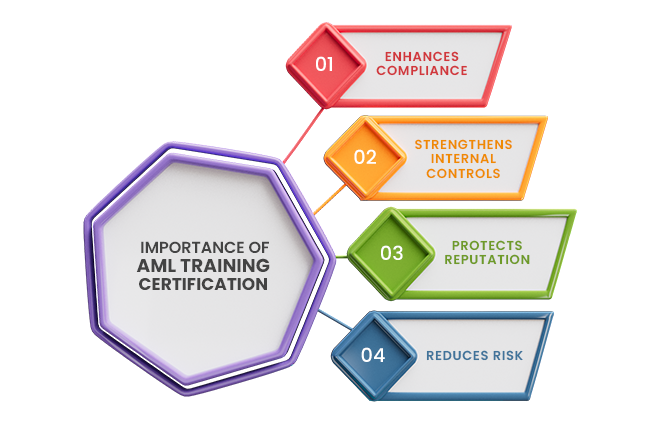Importance of AML Training Certification

1. Enhances Compliance:
AML training certification ensures that financial institutions and DNFBPs comply with both local and international AML regulations. This compliance is critical for avoiding fines, legal penalties, and potential operational shutdowns.
2. Strengthens Internal Controls:
Certified AML training equips employees with the knowledge and skills needed to identify and report suspicious activities. This strengthens the institution’s internal controls and enhances its ability to detect and prevent money laundering.
3. Protects Reputation:
Financial institutions and DNFBPs with certified AML training are better positioned to protect their reputation. Demonstrating a commitment to AML compliance builds trust with clients, stakeholders, and regulatory bodies.
4. Reduces Risk:
Properly trained staff can more effectively identify and mitigate risks associated with money laundering and financial crime. This proactive approach helps safeguard the institution from potential financial and reputational damage.
Importance of Continuous Professional Development (CPD) for Financial Institutions and DNFBPs
1. Keeps Skills Updated:
Continuous Professional Development ensures that employees stay updated with the latest industry trends, regulations, and best practices. This is crucial for maintaining a competitive edge in the financial sector.
2. Enhances Employee Performance:
Ongoing training and development programs improve employee performance by providing them with new skills and knowledge. This leads to increased efficiency and productivity within the organization.

3. Supports Career Growth:
CPD helps employees advance their careers by equipping them with the necessary skills and qualifications. This not only benefits the individual but also contributes to the overall growth and success of the institution.
4. Ensures Regulatory Compliance:
Regularly updated training programs ensure that employees are aware of and adhere to the latest regulatory requirements. This helps institutions avoid compliance issues and potential penalties.
Importance of Continuing Legal Professional Development (CLPD) Training Program for Legal Professionals and Lawyers
1. Maintains Professional Competence:
CLPD ensures that legal professionals and lawyers maintain their professional competence and stay current with changes in the law, legal procedures, and industry standards.
2. Enhances Legal Skills:
Ongoing legal training programs improve the skills and knowledge of legal professionals, enabling them to provide better services to their clients and enhance their legal practice.
3. Supports Career Advancement:
CLPD provides legal professionals with the opportunity to specialize in specific areas of law, thereby advancing their careers and increasing their value to their employers and clients.

4. Ensures Ethical Standards:
Regular training on ethical standards and professional responsibilities helps legal professionals maintain high ethical standards, fostering trust and credibility in the legal profession.
Adil Zone's AML Compliance Courses
Tailored Training Programs:
Adil Zone offers specialized AML compliance courses designed to meet the specific needs of financial institutions, DNFBPs, and legal professionals. These courses cover a wide range of topics, including AML regulations, risk assessment, and reporting procedures.
Expert Instructors:
The courses are led by experienced professionals who provide practical insights and real-world examples. This ensures that participants gain a deep understanding of AML practices and how to apply them effectively.
Certification and CPD:
Adil Zone has partnered with Compliance 360, an organization approved by the Knowledge and Human Development Authority (KHDA). Together, they offer AML compliance courses that provide certification upon completion. This certification helps institutions demonstrate their commitment to compliance. Additionally, these courses count towards CPD requirements, ensuring that employees’ skills and knowledge remain up to date.
Continuous Learning:
Adil Zone offers ongoing training and development opportunities to help institutions stay ahead of regulatory changes and emerging threats. This continuous learning approach supports both CPD and CLPD requirements, fostering a culture of compliance and professional growth. By enrolling in Adil Zone’s AML compliance courses, financial institutions, DNFBPs, and legal professionals can enhance their ability to detect and prevent financial crime, maintain regulatory compliance, and support continuous professional development.


